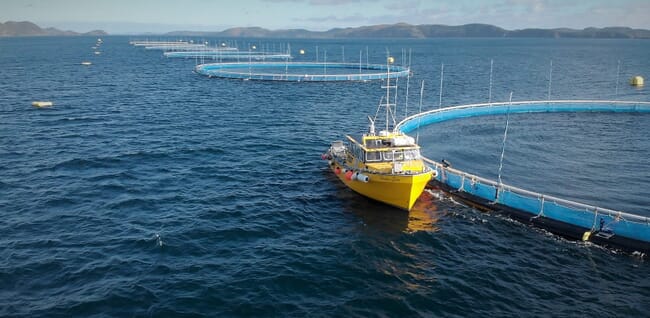
The system will provide baseline data on dissolved oxygen, salinity, chlorophyll, blue-green algae and turbidity levels at the site, as well as information on currents and weather, before the 10 pens are stocked with Atlantic salmon later this year.
“Real-time data is a necessity for today’s aquaculture operators because it helps them protect fish stocks, optimise production and operate in a safe, sustainable manner,” said Tim Stone, Innovasea’s vice president of product development in a press release. “We’re excited to provide Grieg with the best environmental monitoring tools in the industry so it can successfully open up this new area to salmon farming over the next decade.”
The deployment is part of a $27 million initiative with Canada’s Ocean Supercluster that aims to improve data-driven decision making in aquaculture. Grieg is leading the Supercluster’s integrated operations and real-time analytics project in partnership with Innovasea and SubC Imaging.
“We are thrilled to see the work of the integrated operations and real-time analytics project team continue to advance, and celebrate this important milestone along with them,” said Kendra MacDonald, CEO of Canada’s Ocean Supercluster. “The collaborative efforts of the Ocean Supercluster and the project partners will deliver a transformative global operations capability in aquaculture and provide important environmental, safety and economic benefits.”
The environmental monitoring system at the remote site includes wireless aquaMeasure sensors and an aquaHub that uploads data to the cloud via a cellular network. Setting up the real-time system in advance will enable Grieg to deliver on its promise to carefully introduce sustainable salmon farming to Placentia Bay.
“Our technology delivers real-time data to farm operators 24/7, no matter where they are so they can make objective, analytical decisions well in advance or at a moment’s notice,” said Stone. “A lot of aquaculture sites are in rugged, far-off locations, but Innovasea’s solutions ensure the data is always available when you need it.”
This year Grieg will transfer 3 million salmon smolts from its hatchery in Marystown, Newfoundland to the pens in Placentia Bay. The first fish are due to be harvested in 2023, with the company planning to harvest 15,000 tonnes of salmon in the region by 2025.
Eventually Grieg aims to raise salmon across 11 sites in Placentia Bay, harvesting up to 45,000 tonnes per year.



